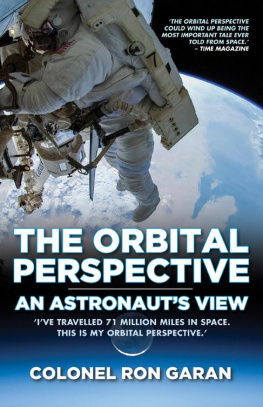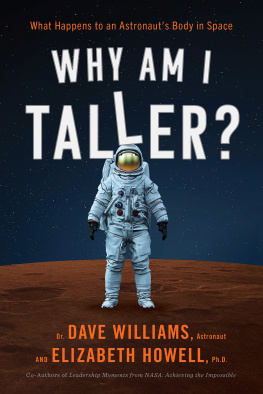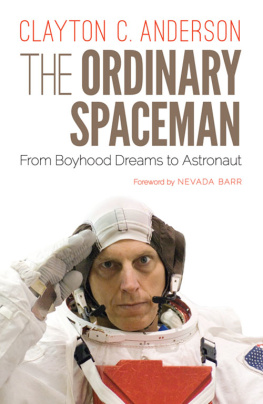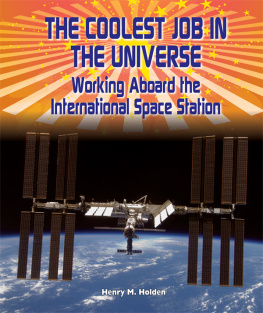On the back cover is a photo that my crewmate and space walking partner Mike Fossum took of me while I was in the cupola of the International Space Station. The photo was taken from the Russian docking compartment Pirs as we passed over coastal Australia.
I have always called this picture Downside Up Down Under. Peter Gabriel inspired the name of the photo through the many discussions he and I have had, both on Earth and while I was in space, about the nexus between space, music, culture, and the orbital perspective. Peters song Downside Up and his explanation of the song perfectly capture the sentiment of the photo and the essence of the orbital perspective: At one point the world turns upside down, and you have to imagine lying on a field of grass and looking up at the sky long enough that you start to see the sky as down, as an ocean below you, and that is the state downside up.
Downside up, upside down
Take my weight from the ground
Falling deep in the sky
Slipping in the unknown
All the strangers look like family
All the family looks so strange
The only constant I am sure of
Is this accelerating rate of change
I stand here
Watch you spinning
Until I am drawn in
A centripetal force
You pull me in
PETER GABRIEL
To my family: my wife, Carmel, and our sons, Ronnie, Joseph, and Jake. Thank you for being my inspiration and for enabling me and accompanying me on this incredible journey. And to all those laboring to make life on Earth as beautiful as our planet looks from space.
As you read of Rons discovery of his lifes goal and purpose during his time in space, I hope you will also reflect on your own lifes goal and purpose here on Earth. What are the problems you consider impossible to solve hunger, poverty, war, environmental issues and how can you gather together with others to solve these problems? Use Rons idea of the orbital perspective as a way to erase obstacles, boundaries, and resistance to any problem.
If you had asked bankers thirty years ago whether a bank could lend billions of dollars to millions of extremely poor women in a country like Bangladesh without any collateral and with nearly a one hundred percent repayment rate, they would have laughed at you! Today, this is done globally even in New York, San Francisco, and Los Angeles and is a tested tool to counter poverty and give self-reliance. Another kind of business, a nondividend business, is becoming popular globally to address problems that were never considered amenable to sustainable solutions by business methods. What other tools can you discover if you put your mind and heart into the question?
Ron has shared with us his unlimited view of Earths possibilities from the vantage point of the International Space Station. May we use this beautiful perspective for the good of all with whom we share our beautiful home, this fragile oasis known as Earth.
Muhammad Yunus
Nobel Peace Laureate
I have wanted to write this book since returning to Earth from my first space mission in 2008. Launching on Space Shuttle Discovery fulfilled of a lifelong dream of flying in space. It also marked the start of another quest a quest that would lead me to reject the status quo on our planet, a quest to help reduce the sobering contradiction we see when we look at our planet from space, and a quest to help make life on Earth as beautiful as the visible beauty of this planet when seen from space.
I returned from that mission with a compelling need to share a profound feeling of hope that was singed into my awareness from the experience. I call this awareness the orbital perspective, and this awareness came with a responsibility to highlight the need for effective global collaboration. My goal in writing this book is to spark change very simple, but exponentially powerful change. I was compelled by a simple idea: our world still faces numerous problems because we have not, to date, learned how to work together. But I believe that the entire landscape of our society is changing, making available powerful collaborative tools that can engage the collective genius of our global society like never before. We are living in times of unprecedented interconnectedness an interconnectedness that empowered a fruit vendor in Tunisia to spark a collective movement that has changed the world.
We live in a world where exponentially increasing technological advancements and interconnectivity are making the impossible possible on a daily basis. Commonly held beliefs about whats possible and whats not are being overcome by events. We do not have to accept that the suffering and conflict on our planet are inescapable. I believe we live in a world where the possibilities are endless and limited only by our imagination and our will to act. The secret to achieving these critical things is to pull back to the point where we can see all the pieces of the puzzle and how they fit together, and where it also becomes apparent that our own backyard is bigger than we think. Our sphere of influence is in fact global. This is the orbital perspective.
I wrote this book to help create a global movement a movement of inhabitants of this planet, known as humans, who believe that nothing is impossible, who are willing to set aside their differences and work together toward our common goals. I wrote this book to start a global conversation and to spread the awareness that it is no longer acceptable to have a go-it-alone attitude. The problems facing our world are too big, the challenges too critical, and the potential catastrophes too imminent to adhere to the old way of doing things.
We are past the point where any one organization or nation can go it alone and still effect any kind of real course correction to the trajectory of our shared future. The missing link that would bridge the gap between our problems and their solutions is simple to state yet challenging to implement. The answer is collaboration true collaboration, which I will define and describe throughout this book, not the false collaboration that has become the latest buzzword.
There may be a tendency to discredit my words as overly optimistic or unrealistic. But I understand that, in the end, all governments will make decisions that are in accordance with what they believe to be in their national interest, and that many perverse incentives are stifling progress toward achievement of our goals. My view comes from seeing the worst and best we as a human species have to offer, from visiting the heights of space to working with those in destitute poverty. During my time in combat, I was routinely shot at and experienced the death of squadron mates and friends. I have experienced firsthand and have participated in the horrors that partly define life on this planet. Nonetheless, I remain optimistic that we can rise above the challenges we face.
FRAGILE OASIS
I hope that you find this book entertaining, engaging, and thought-provoking, but if after reading it all you have received is entertainment and a slight shift in perspective, I will have failed. My intention is to communicate a call to action. I am asking everyone to look for ways to create exponential, disruptive, positive action action that leads to exponential advancement toward solving the challenges facing our world. I do not claim to have all the answers, and I know that there is great complexity in the topics I discuss, but I hope that after reading this book you will agree that were on to something big that can potentially change the present trajectory of our global society and put it on a profoundly more positive path.





